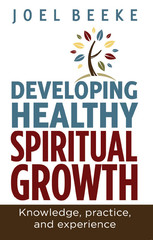by Joel Beeke
 Self-humiliation and self-denial are essential for spiritual growth in practice. There is no other way to grow in Christ’s pattern.Thomas Watson (c. 1620-1686) said,‘The right manner of growth is to grow less in one’s own eyes.’ If it was fitting for God’s sinless Son to humble himself, how much more for sinful people such as we are, to think less of ourselves as we grow in self-knowledge? This is what it means to grow down into Christ’s pattern, for Christ taught us that the pattern of his kingdom was to pursue greatness by becoming a humble servant to others (Mark 10:43-45).We grow down into greatness.
Self-humiliation and self-denial are essential for spiritual growth in practice. There is no other way to grow in Christ’s pattern.Thomas Watson (c. 1620-1686) said,‘The right manner of growth is to grow less in one’s own eyes.’ If it was fitting for God’s sinless Son to humble himself, how much more for sinful people such as we are, to think less of ourselves as we grow in self-knowledge? This is what it means to grow down into Christ’s pattern, for Christ taught us that the pattern of his kingdom was to pursue greatness by becoming a humble servant to others (Mark 10:43-45).We grow down into greatness.
What does that say, then, about professing Christians who are arrogant, bossy, harsh, insensitive, unwilling to listen, self-seeking and power-hungry? Even unbelievers can see the hypocrisy in such prideful egotism. But how beautiful is the meekness of children of God, who humble themselves to serve others and willingly take up the cross of suffering. We cannot serve Christ in any other way, for no other way is worthy of him.
When we strive to follow Christ in self-denial and humble service, we come face to face with our remaining sin. We discover that we must do more than conquer the sins of the flesh, such as drunkenness, lust, or laziness. We discover that the sins of the spirit are even more heinous in God’s sight: unbelief, pride, ambition, covetousness, envy, hatred, bitterness and hardness of heart. It can be a shock to discover how much ground has to be cleared before we can begin to grow. J. I. Packer says in his book Rediscovering Holiness:
Pride blows us up like balloons, but grace punctures our conceit and lets the hot, proud air out of our system.The result (a very salutary result) is that we shrink, and end up seeing ourselves as less — less nice, less able, less wise, less good, less strong, less steady, less committed... — than we thought we were.We stop kidding ourselves that we are persons of great importance to the world and to God.We settle for being insignificant and dispensable.Off-loading our fantasies of omnicompetence, we start trying to be trustful, obedient, dependent, patient, and willing in our relationship with God... We bow to events that rub our noses in the reality of our own weaknesses, and we look to God for strength quietly to cope.
The Heidelberg Catechism calls this process ‘the mortification’ (‘putting to death’) of the old man, involving ‘a sincere sorrow of heart that we have provoked God by our sins, and more and more to hate them and flee from them’. In other words, the old self must be pulled down from its throne, and sin must be assailed and subdued, for Christ’s sake.
We then experience that spiritual growth entails what John the Baptist professed in John 3:30:‘He [Christ] must increase, but I must decrease.’ We also experience the answer to the prayer of the Heidelberg Catechism (Q. 123): ‘Rule us so by Thy Word and Spirit, that we may submit ourselves more and more to Thee.’ We grow in humility to live a life worthy of Christ.
From Developing Healthy Spiritual Growth: Knowledge, Practice and Experience by Joel R. Beeke
